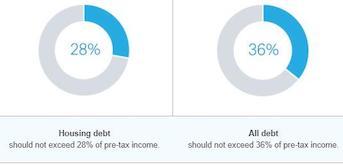How Much House Can You Afford?
An easy way to run the numbers.
Our two cents
Whether you're looking at a fixer-upper or the house of your dreams, there's one basic question that you have to answer before you do anything else: Can you afford it? The answer doesn't have to be complicated. It really comes down to your monthly income and your other financial obligations.
A simple formula—the 28/36 rule
Here's a simple industry rule of thumb:
- Housing expenses should not exceed 28 percent of your pre-tax household income. That includes your monthly principal and interest payments, plus additional expenses such as property taxes and insurance.
- Total debt payments should not exceed 36 percent of your pre-tax income—credit cards, car loans, home debt, etc.
Safe debt guidelines
© 2026 Charles Schwab & Co., Inc. All rights reserved. Member SIPC.
So start by doing the math. If you make $50,000 a year, your total yearly housing costs should ideally be no more than $14,000, or $1,167 a month. If you make $120,000 a year, you can go up to $33,600 a year, or $2,800 a month—as long as your other debts don't push you beyond the 36 percent mark.
What to do before you buy
Whatever you can afford, you want to get the best mortgage rates—and you want to be in the best position to make an offer on your house. Make these steps part of your preparation:
- Check your credit score. Your credit score can have a direct affect on the interest rate you'll pay. Check your score, and do what you can to improve it. You can get a free credit report at AnnualCreditReport.com.
- Get pre-approved. Go to a lender and get pre-approved for a loan before you make an offer on a house. It will put you in a much stronger bargaining position.
